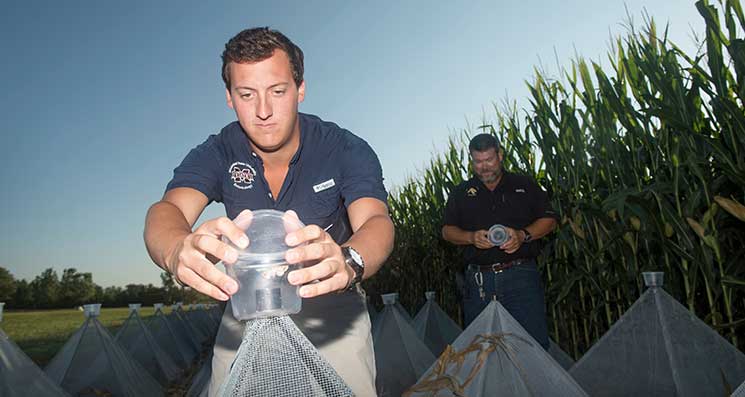Graduate Studies

The Department of Biochemistry, Molecular Biology, Entomology and Plant Pathology is a comprehensive department offering several degree pathways.
Master of Agriculture
- Entomology
- Plant Pathology
Master of Science in Agricultural Life Sciences
- Biochemistry
- Entomology
- Plant Pathology
Doctor of Philosophy in Molecular Biology
Doctor of Philosophy in Life Sciences
- Biochemistry
- Entomology
- Plant Pathology
Interdisciplinary Programs
- Master of Science in Agriculture with a concentration in Animal Nutrition
- Master of Science in Agricultural Life Sciences with a concentration in Animal Physiology
- Master of Science in Agricultural Life Sciences with a concentration in Genetics
- Doctor of Philosophy in Agricultural Sciences with a concentration in Animal Nutrition
- Doctor of Philosophy in Life Sciences with concentration in Animal Physiology
- Doctor of Philosophy in Life Sciences with concentration in Genetics
Admission Criteria
Final acceptance into a graduate program is contingent upon the availability of a suitable major professor.
- A bachelor’s or master’s degree in a physical or life science with a strong background in the program discipline of interest (biochemistry, molecular biology, entomology, or plant pathology).
- A minimum 2.75 overall GPA on a 4.00 scale.
- Scored results of the GRE general test recommended but not required.
- International students are required to have a TOEFL (Test of English as a Foreign Language) score of 500 PBT (61 iBT) or an IELTS (International English Language Testing Systems) score of 5.5 (non-English speaking international students)
Provisional Admission: An applicant who has not fully met the GPA requirement stipulated by the university may be admitted on a provisional basis.
The provisionally-admitted student is eligible for a change to regular status after receiving a 3.00 GPA on the first 9 hours of graduate courses at Mississippi State University (with no grade lower than a C). The first 9 hours of graduate courses must be within the student’s program of study. Courses with an S grade, transfer credits, or credits earned while in unclassified status cannot be used to satisfy this requirement. If a 3.00 is not attained, the provisional student shall be dismissed from the graduate program.
While in the provisional status, a student is not eligible to hold a graduate assistantship.
Master of Agriculture
Entomology concentration: This non-thesis option requires 30 hours of coursework as approved by the graduate committee. Students will also have to complete a scholarly activity, participate in research projects, and develop a scholarly document focused on subject area.
Plant Pathology concentration: This non-thesis option requires 30 hours of coursework as approved by the graduate committee. Students will also have to complete a scholarly activity, participate in research projects, and develop a scholarly document focused on subject area.
Master of Science in Agriculture
Animal Nutrition concentration: An interdisciplinary curriculum that includes 30 hours of coursework and a thesis.
M.S. in Agricultural Life Sciences
Biochemistry concentration: Available as a thesis or non-thesis program. The thesis option requires 30 hours of coursework. The non-thesis option requires 33 hours of coursework. A research paper equivalent to a research literature review is required in this option.
Entomology concentration: Requires 30 hours of coursework and a thesis.
Plant Pathology concentration: Requires 30 hours of coursework and a thesis.
Animal Physiology concentration: An interdisciplinary program that requires 30 hours of coursework and a thesis.
Genetics concentration: An interdisciplinary program that requires 30 hours of coursework. Available as a thesis or non-thesis program. A comprehensive exam is required in the non-thesis option.
Ph.D. in Molecular Biology
The Molecular Biology Ph.D. degree is primarily a research degree. A minimum of 30-40 hours of coursework and 30 hours of research beyond the B.S. degree are required. A student entering the program with a master’s degree will be required to take 30-40 hours past that degree.
Ph.D. in Life Sciences
Biochemistry concentration: Requires a minimum of 40 credit hours of coursework and at least 20 research hours above the baccalaureate degree (60 hours total) for students entering with only a baccalaureate degree. Students entering the Biochemistry concentration with an M.S. degree have a required minimum of 40 hours past that degree utilizing a combination of coursework and research hours (with a minimum of 20 hours of research/dissertation).
Entomology concentration: Requires 60 credit hours of coursework above the baccalaureate degree.
Plant Pathology concentration: Requires 60 credit hours of coursework above the baccalaureate degree.
Animal Physiology concentration: Requires a minimum of three academic years beyond the B.S. degree; the number of hours will vary as determined by the student and major professor. The student is required to take at least 3 hours of PHY 8811 and PHY 8841.
Genetics concentration: Requires written preliminary and oral comprehensive examinations, a dissertation, and coursework designated by the student’s graduate committee, including 20 research/dissertation hours.
Ph.D. in Agricultural Sciences
Animal Nutrition concentration: This concentration has no course requirements; however, BCH 6603, BCH 6613, ST 8114, and ST 8214 are required if they were not completed during the student’s master‘s degree. Additionally, a language or research skill requirement, a preliminary/ comprehensive examination, and a final dissertation defense are required.
Graduate Coordinators
Dr. Krish Krishnan
Biochemistry/Molecular Biology/Entomology/Plant Pathology
Dr. Carrie Vance
Animal Physiology/Genetics/Nutrition
Quick Links
- Academic Calendar
- Apply Online
- Courses
- Curriculum
- Facilities
- Financial Aid
- Graduate Bulletin
- Locate Clay Lyle Entomology Bldg.
- Locate Dorman Hall
- Schedule A Visit
- Student Housing
- Student Organizations
Want to know more?
Contact:
Dr. Krish Krishnan | 662.325.2978
Biochemistry
Molecular Biology
Entomology
Plant Pathology
Dr. Carrie Vance | 662.325.3139
Animal Physiology
Genetics
Nutrition
